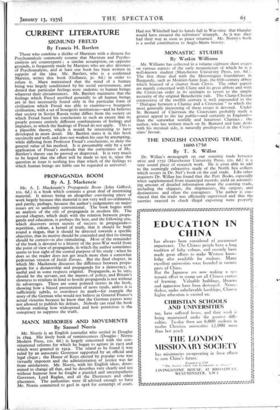PROPAGANDA BOOM By A. J. Mackenzie
Mr. A. J. Mackenzie's Propaganda Boom (John Gifford, ros. 6d.) is a book which contains a great deal of interesting material. It misses being an altogether convincing piece of work largely because this material is not very well co-ordinated, and partly, perhaps, because the author's judgements on major issues are so uniformly conventional. The book begins with an analysis of the role of propaganda in modern life. The second chapter, which deals with the relation between propa- ganda and education, is perhaps the best, and the following one, which discovers seven secrets of success in propaganda— repetition, colour, a kernel of truth, that it should be built round a slogan, that it should be directed towards a specific objective, that its motive should be concealed and that its timing should be correct—is also stimulating. Most of the remainder of the book is devoted to a history of the post-War world from the point of view of propaganda, in which the author sometimes seems to lose sight of the central purpose of his study : when he does so the reader does not get much more than a somewhat pedestrian version of Inside Europe. But the final chapter, in which Mr. Mackenzie discusses the difference between propa- ganda for a dictatorship and propaganda for a democracy, is useful and in some respects original. Propaganda, as he says, should be the servant, not the master, of policy, and Britain's slowness to retaliate in kind to hostile propaganda is not without its advantages. There are some pointed stories in the book, showing how a biased presentation of news tends, unless it is sufficiently subtle, to overshoot its mark—for example the story of the German who would not believe in General Franco's actual victories because he knew that the German papers were not allowed to publish his defeats. Nobody can read the book without realising how widespread and how pernicious is the conspiracy to suppress the truth.






































 Previous page
Previous page